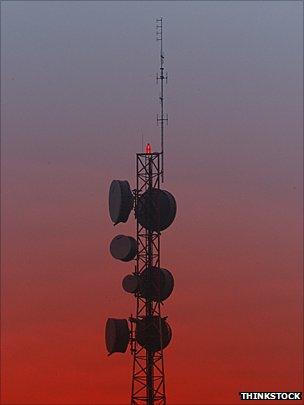Smartphone Britain: Ofcom's angst
- Published
- comments

In the summer a major report from the regulator Ofcom, external on the UK communications industry told us that we had become a smartphone nation, ultra-connected night and day via the magic of the new mobile technology.
But all of that depends on good networks, and there's worrying evidence that the UK may be in danger of falling behind, both in adopting the latest technology and making sure everyone can use it. And it is Ofcom which will be in the dock if that fails to happen.
Late on Friday I got an email from Vodafone welcoming what it called "the Ofcom announcement of the timetable for the 4G auction".
Which was strange, because I had heard nothing from Ofcom.
A few inquiries revealed that the regulator had made a very important decision - to postpone the auction of the next generation of mobile phone spectrum from the first half of 2012 to the last quarter.
Now this might seem like a minor delay, but when other countries are already much further down the road in preparing for the arrival of 4G, which promises much greater speeds and capacity for mobile networks, it is worrying. Yet Ofcom had somehow slipped out the news without even issuing a press release - indeed last time I looked at its website, external there was still nothing there.
It seems that Ofcom had intended to announce the postponement after the weekend but was bounced into letting it out early when various operators started talking about it.
As far as I understand, it was the threat of litigation over the terms of the 4G auction from disgruntled network operators which forced the delay. Better I suppose to get them all signed up to the terms - if that is possible - than to risk years in the courts with the whole process frozen.
But if that is the case, then Ofcom should be out there explaining it.
Signal boost
And another concern emerged over the weekend when an exchange of letters between the Communications Consumer Panel and Ofcom was published. It concerned mobile notspots - those places which don't even get 2G - and there were some strong words from the panel which advises Ofcom on consumer matters.
"We do not believe that the current coverage on 2G meets the legitimate aspirations of consumers or the needs of small businesses," said the panel's letter, external.
It went on to assert that even after the arrival of 4G, those people in notspots now are unlikely to be any better served. The panel's suggestion was that some money should be set aside from the proceeds of the 4G auction to rectify this.
Ofcom's Chairman Colette Bowe replied to this letter, external, essentially agreeing to its analysis, and saying that the regulator is currently researching just how many new masts would be needed to fill in the holes in rural coverage and at what cost.
Her letter, though, said that deciding to set aside money from the auction for this purpose was a decision for the Treasury, not Ofcom.
Last week the Chancellor George Osborne appeared to have shot this particular fox, announcing that £150m from central government funds - not from the 4G auction - would be allocated to improve mobile coverage.
While welcoming this news, the Communications Consumer Panel still has two concerns.
It believes far more than £150m will be needed to do the job - some estimates put the overall bill at £500m - and it fears that the process of allocating the cash could take too long.
So, plenty of headaches for Ofcom. It needs to move the UK into the modern mobile internet era, while keeping the operators, the Treasury and rural consumers onside. Who'd be a regulator?